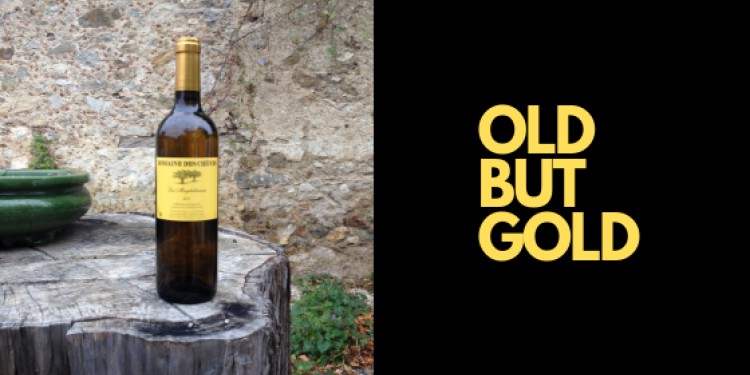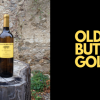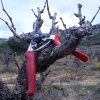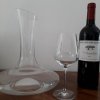Les Vins Blancs Vieux - OLD BUT GOLD
Why do I like aged white wines and why do I offer them ?
In my case, I do not know when started my attraction for old white wines. Maybe being Catalan, I was early confronted with old Rivesaltes and Rancios. Wines that silenced the most talkative. The latter speaking only by language slams, nods and complicit glances. It was during these late nights of "Festa major", the great votive festivals of our villages of the South where we went to tour the "barricots". These little barrels in which our fathers and grandfathers had patiently added each year, the best white wines of Macabeu in an endless solera. Hard test for the neophyte to be confronted with these powerful aromas of nuts and curry. We know today that the molecule responsible for these odors is the sotolon. This compound, formed during the breeding, is also found in the « Vin jaune » or in the Jerez. After such an introduction, I could face all the wines of the planet. For an initiation, we could have done more subtle.
During my oenology studies, passionate about tasting, I gradually discovered this complex world of old wines. The red ones of course but, even more surprising, the whites that were introduced to us by the vine growers of the vineyards we visited. These beautiful verticals in Burgundy, Loire, Jurançon, Rhône, Jura, Alsace and even Champagne have strengthened my taste for these wines of an aromatic richness often indefinable.
I could have worried about this singular attraction for well-bred wines if I had not met, in my young career, some other passionate people sharing my tastes. First of all the grandfather Jaboulet that I met in 1981 while I was interested in the aromas of Syrah. After a hot afternoon of harvest in Tain Hill, he invited me to discover some nectars from his personal winery. Among them : an eight-year-old Roussanne who has left an indelible trace in my memory. It is also this memory that made me plant the first vineyard of Roussanne in Roussillon when, a few years later, our appellations were opened to the grape varieties of Rhone. At the same time, in my quest for knowledge, I had the chance to meet other enthusiasts of aged wines and to exchange during long discussions. Among them, I will mention Gaston Huet in Vouvray, Jean Hugel in Riquewihr, Guy Roulot in Meursault, Henri Maire in Arbois, and of course the Catalan friends: Pierre Torres and, on the other side of the Pyrenees, Miguel Torres. I was proud to share these convictions with such winemakers. But is it a case of old-fashioned people? I do not think so because for having exchanged recently with Yves Confuron, one of my former students, I realize that others, younger, share this attraction for well-bred and evolved wines.
After a few decades as a researcher on aromas in the laboratories of INRA and Agro, I begin to understand why old wines develop such a complex aromaticity. In fact, if young wines quickly lose their fermentation aromas, they are quickly replaced by a cohort of molecules that form under the effect of aging. I mentioned Sotolone, but this molecule is not the only one to appear. The slow hydrolysis of the glycosides and the interconversions or chemical modifications of the molecules of which they are the precursors, amplify month after month the power and the aromatic complexity. Would it be sacrilege to taste a Muscat under one year old? I am not far from thinking it. On another note, in an old wine, I wait for the gradual appearance of dimethyl sulphide with the wonderful smell of truffle and black olive, piperitone and its menthol smell, some norisoprenoids and their notes of tea. , balsamic, mineral or even petrol, coumarins with hay and dried flowers smell, furfuryl alcohol with the smell of verbena ... This list is long, non-exhaustive, and I will not give you a lesson on aromas. But these aromas, beautiful as they are, are not the only guarantors of an aptitude for aging. Balance and taste power are essential. Some will talk to you about the acid freshness as a guarantee of a good evolution. Yes certainly, but we will not forget a discreet tannic presence combined with a slight hint of bitterness. These last sensations are opposed in a harmonious dialogue with the sweetness brought by the alcohol and the polysaccharides extracted from the yeasts by a laborious batonnage. In a nutshell, the goal is a certain "intelligent" concentration without being overwhelming. Fullness due to low or moderate yields rather than exaggerated extraction or exclusive passage in new barrels.
I'm lucky, the clay-limestone soil of Vingrau gives a nice acid tension to my wines. During the production of the Les Sorbiers and Les Magdaléniens, I apply myself to highlight all these elements from the vineyard and the choice of soils to pursue, in the cellar, by the application of simple and respectful techniques: gentle extraction, slow fermentation, long aging... It is at this price that today I can taste these wines after more than ten years of guard. Like the great Burgundy and the great Chenin, these wines embellish with age. Do not worry I am also fond of young wines, but the intensity of the emotion is not the same. In our world where immediacy is in order, few people have a wine cabinet or a cool enough place to let their old bottles age. At the Domaine des Chênes, we do it for you by proposing today amazing 2014 and 2015 whites full of freshness. Cheers !
- Alain Razungles











